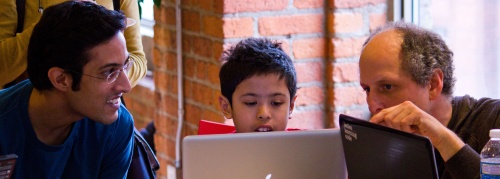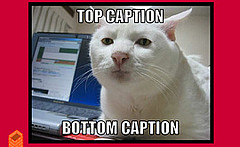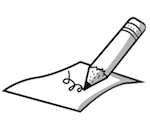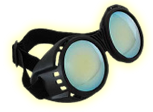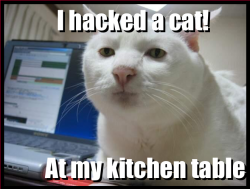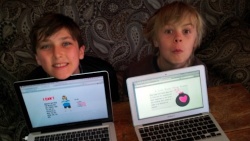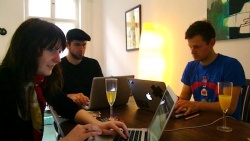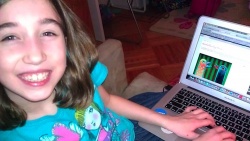Webmakers/events/kitchen table
From MozillaWiki
Kitchen Table Host Guide
Learn with friends!
2 – 10 people. 15 minutes - 1 hour. At home or a cafe.
A Kitchen Table event is a fun way to:
- hang out with friends around your kitchen table
- and make cool things on the web.
This guide will help! It's a community document, so please add your ideas and see also what other hosts did.
Before the event
Decide what you want to make
- Select a project to get you started with making things on the web.
- Think about the interests and skill levels of your group. Adapt projects accordingly.
- If you try something different, let us know how it went.
Find a space and a date
- Find a comfortable, flexible space. Your kitchen or living room are good, or a nearby cafe. Make sure you can move the chairs and sit together in a circle.
- Think about wifi and power, good lighting, and snacks.
- Pick a date. Give yourself enough time and make sure the date works for your friends.
Invite your friends
- Write a short invitation. If your friends should bring something, include a reminder.
- You can use the sample text below.
- If you're feeling creative, try remixing an invitation using the Hackasaurus X-Ray Goggles.
Want to remix a website? Join me in LOCATION, DATE.
I'm going to learn how play with code & thought you might want to, too!
On DATE we're hanging out in LOCATION to make something together online.
There will be yummy snacks, hacking, and the company of friends.
Bring a computer, if you can.
Let me know if you can come.
— Sincerely, YOU
At the event
Say hello
- Make sure everyone has access to a laptop, power and the internet.
- Introduce the group, if they don't know each other.
- Give a brief overview. What will you make today?
Try out a project
- Demonstrate the webmaker project you selected earlier.
- Now let your friends try.
- Check in with everyone. Answer questions and make sure the group is ready before going to the next step.
Keep hacking
- If someone wants to try something else, they can select another webmaker project.
- You can also find other activities online to fit their interests and skill level. These sites have great documentation and tutorials as well:
- Peer to Peer University (P2PU)
- Mozilla Developer Network (MDN)
- World Wide Web Consortium (W3C)
- Code Academy
- Check in with your friends to make sure they're doing alright.
- Hit "Publish" when you’re finished.
- Show your friends what you made and ask to see their work, too.
- If you like, please share your hacks with the world!
- Paste the URL in this etherpad
- or tweet the hack and tag it #mozparty
- or upload a picture to a gallery, such as Flickr, and tag it with #mozparty.
After the Event
Wrap Up
- Ask everyone how it went. Encourage feedback about the event and the projects. What did they learn? What did they like? If they have suggestions for making it better, be sure to take notes.
- Talk about continuing to hack together. You may want to keep playing with these projects or to try new ones later. Talk about what your friends would like to do next, such as organize another kitchen table event.
- Set a date. If there's enough interest, pick a date for the next time!
Let us know how it went
- Please share your experience hosting the event and about the projects, including links to the things you made.
- We’ll send an email reminder after the event to collect your feedback.
- We invite you to a debrief call for all betatesters:
- Thursday, May 31:
- 1600h UTC (1800h CEST / 1700 BST / 1200 EDT / 0900 PDT)
- on the Webmaker conference line
Need help?
While you don't need anybody's permission to organize a webmaker event, we have a team of passionate people ready to help you with planning and answer your questions.
- Let us know you're interested or thinking about organizing an event.
- Let us put you in touch with others in your region who are part of the community
- Let us help you in making use of these event pages, and improve in the process
